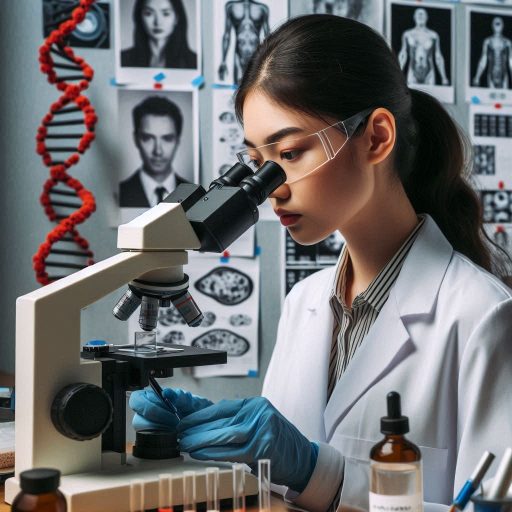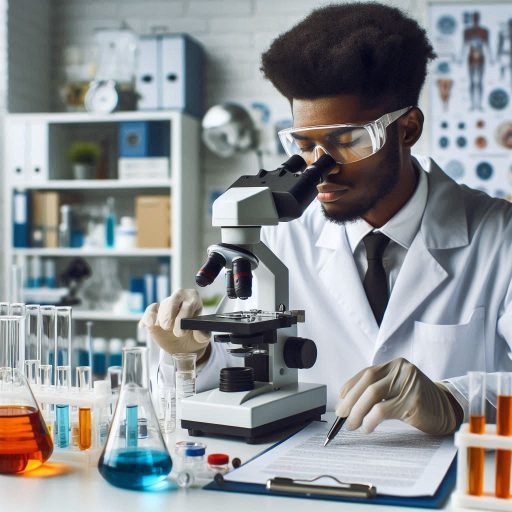Introduction
Forensic science offers a wide range of specializations, each focusing on different areas of criminal investigation.
These specializations include forensic toxicology, DNA analysis, forensic anthropology, digital forensics, and crime scene investigation, among others.
Each field plays a vital role in solving crimes and ensuring justice is served.
By examining evidence, forensic scientists provide critical information that can link a suspect to a crime or prove innocence.
Choosing the right specialization in forensic science is crucial for a successful career.
Specializing allows forensic scientists to develop deep expertise in a specific area, enhancing their value in investigations.
A forensic toxicologist detects and identifies drugs, poisons, or alcohol in a body.
In contrast, a forensic anthropologist studies skeletal remains to determine identity and cause of death.
Both roles require unique skill sets and offer different challenges.
The decision to specialize should align with personal interests and strengths.
Forensic science is a demanding field, and passion for the work can drive long-term success.
Those interested in technology might thrive in digital forensics, analyzing data from computers or mobile devices to solve cybercrimes.
On the other hand, individuals fascinated by biology may find DNA analysis fulfilling, helping law enforcement with accurate genetic matching.
DNA Analysis
Explanation of DNA Analysis in Forensic Science
DNA analysis is a cornerstone of forensic science, enabling the identification of individuals with high accuracy.
This process involves examining genetic material to match DNA profiles from crime scenes to suspects or victims.
The uniqueness of each person’s DNA makes this method a powerful tool for solving criminal cases.
Even in instances where evidence is minimal or decades old, DNA analysis can provide definitive links.
Role of DNA Analysis in Solving Crimes
Forensic scientists use DNA analysis to solve various types of crimes, from violent offenses like murder and assault to property crimes such as burglary.
By comparing DNA found at crime scenes to samples from suspects, investigators can confirm or eliminate potential matches.
This technique is especially useful in cold cases, where new advances in technology can analyze old evidence and yield results that were previously unattainable.
DNA has also played a crucial role in exonerating wrongfully convicted individuals, highlighting its importance in ensuring justice.
DNA analysis goes beyond matching suspects to crime scenes.
It can help identify human remains in mass disasters, link multiple crimes to the same perpetrator, and even establish biological relationships, such as in paternity cases.
In cases involving unidentified bodies, forensic scientists use DNA to match the remains with missing persons, providing closure for families.
Skills Required for DNA Analysis Specialization
To specialize in DNA analysis, forensic scientists need a robust set of technical and analytical skills.
A deep understanding of genetics and molecular biology is fundamental to mastering this field.
DNA analysts must know how to extract, amplify, and sequence DNA from various biological samples, such as blood, hair, or saliva.
Proficiency in using sophisticated laboratory equipment, including PCR (polymerase chain reaction) machines and DNA sequencers, is essential for performing accurate analyses.
Attention to detail is another key skill for DNA analysts.
Since DNA analysis often involves very small or degraded samples, precision is critical.
Analysts must avoid contamination and follow strict protocols to ensure the integrity of the evidence.
A high level of concentration and patience is required for handling the complexity of DNA processing.
Critical thinking and problem-solving abilities are also vital.
Forensic scientists must interpret complex data and explain their findings clearly.
They should be able to communicate the results in reports and present them as expert witnesses in court.
This ability to explain scientific results in a legal context is essential for ensuring that justice is served.
In review, DNA analysis plays a pivotal role in solving crimes and securing convictions.
A specialization in this field combines scientific knowledge, technical expertise, and strong analytical skills.
This combination makes it one of the most respected and in-demand areas of forensic science.
Read: U.S. Cities with the Most Opportunities for Environmental Scientists
Crime Scene Investigation
Process of Collecting and Analyzing Evidence at Crime Scenes
Crime scene investigation (CSI) plays a vital role in solving criminal cases by uncovering key evidence.
The process begins when crime scene investigators arrive at the scene to secure the area and prevent contamination.
Their primary goal is to collect, preserve, and analyze physical evidence that can be used in court.
This meticulous approach ensures that no critical detail is overlooked and that the evidence remains intact for further analysis in the lab.
The process of collecting evidence involves several steps.
Investigators first document the scene through photographs and sketches.
This provides a comprehensive visual record that helps recreate the crime.
Next, they systematically search the area for trace evidence, such as fingerprints, footprints, and biological materials like blood or hair.
Each piece of evidence is carefully collected using specialized tools to avoid damaging it.
Investigators then label, package, and store the evidence to prevent contamination and maintain its integrity for future analysis.
Types of Evidence Collected
Various types of evidence are collected at crime scenes, depending on the nature of the crime.
Physical evidence, like weapons or clothing, often provides insight into the actions that took place.
Biological evidence, including DNA from bodily fluids, helps link individuals to the crime.
Latent fingerprints are lifted from surfaces using powder or chemical methods, providing crucial information about who may have been present.
Investigators also collect digital evidence, such as cell phones or computers, which can contain vital information about communications or activities leading up to the crime.
Additionally, trace evidence, like fibers, glass, or soil, can provide further connections between the suspect and the scene.
Training and Certification Requirements for Crime Scene Investigators
Training and certification are essential for crime scene investigators to perform their duties effectively.
Most investigators start with a background in law enforcement, criminal justice, or forensic science.
Formal education, typically at least an associate or bachelor’s degree, provides the foundation for understanding crime scene protocols and forensic techniques.
In addition to academic qualifications, hands-on experience through internships or law enforcement work is often required to develop practical skills.
Certification is another key aspect for crime scene investigators seeking to enhance their credibility and expertise.
Organizations such as the International Association for Identification (IAI) offer certifications in various CSI disciplines.
These certifications demonstrate proficiency in areas like fingerprint analysis, bloodstain pattern analysis, or crime scene reconstruction.
To maintain certification, crime scene investigators must continue their education and stay current on advancements in forensic science.
In essence, crime scene investigation involves collecting and analyzing diverse forms of evidence to solve crimes.
With the right training and certification, crime scene investigators play an indispensable role in the criminal justice system, ensuring justice is served by uncovering the truth through scientific methods.
Digital Forensics
Overview of Digital Forensics Specialization
Digital forensics is a vital specialization within forensic science that focuses on recovering and analyzing digital evidence.
This field has grown rapidly with the increasing reliance on digital devices and online communication.
Digital forensics professionals work to uncover, preserve, and interpret digital data from computers, smartphones, and other electronic devices.
This type of forensic science is crucial for solving a variety of crimes, from cybercrime to traditional investigations that involve digital evidence.
Importance of Digital Evidence in Solving Crimes
The importance of digital evidence in modern crime-solving cannot be overstated.
Digital footprints are often left behind when crimes are committed, whether through emails, text messages, or social media interactions.
This digital evidence can provide crucial leads for law enforcement.
For example, in cases of fraud, digital forensic experts may analyze transaction records to trace fraudulent activity.
In homicide investigations, text messages or GPS data from a suspect’s phone might place them at the crime scene.
In many cases, digital evidence serves as the smoking gun that can lead to a conviction.
Digital forensics is not only about finding evidence but also about ensuring that it is handled correctly.
The integrity of digital evidence is paramount, as mishandling can lead to its dismissal in court.
Digital forensic specialists must follow strict protocols to ensure the data they recover remains unaltered and admissible in legal proceedings.
They often collaborate with law enforcement, legal teams, and other forensic experts to build strong cases.
Properly handled digital evidence can make the difference between a conviction and a case being thrown out of court.
Tools and Techniques Used in Digital Forensics
The tools and techniques used in digital forensics are highly specialized.
Digital forensic experts employ various software programs and hardware tools to recover and analyze data.
These tools can retrieve deleted files, unlock encrypted devices, and track online activities.
One commonly used software is EnCase, which allows investigators to examine data from hard drives, mobile devices, and cloud storage systems.
Another popular tool, FTK (Forensic Toolkit), helps in identifying and recovering hidden, encrypted, or password-protected files.
These tools are essential for digital forensic experts to extract evidence from devices without compromising data integrity.
Additionally, digital forensics professionals utilize techniques like network forensics to investigate cybercrimes.
Network forensics involves analyzing data packets to detect hacking, data breaches, or illegal online activity.
Memory forensics, another key technique, helps investigators examine volatile data stored in a device’s memory, which can reveal important information about what was happening on the device at the time of a crime.
Digital forensics plays a pivotal role in modern crime-solving by uncovering critical evidence from digital devices.
With the right tools and techniques, digital forensic specialists help bring criminals to justice and protect the integrity of the digital evidence they recover.
Read: The Relationship Between U.S. Policy & Environmental Scientist Roles
Toxicology
Definition of Toxicology in Forensic Science
Toxicology in forensic science is the study of chemical effects on the human body, particularly in legal contexts.
It involves analyzing bodily fluids and tissues to detect drugs, alcohol, poisons, or other harmful substances.
Forensic toxicologists play a crucial role in criminal investigations by determining whether chemicals contributed to an individual’s death or impaired their behavior.
This field serves as an essential tool in both criminal and civil cases, aiding in accident investigations, drug overdoses, and poisoning incidents.
Role of Toxicology in Determining Cause of Death
In forensic investigations, toxicology helps establish the cause and manner of death when foul play or poisoning is suspected.
Toxicologists collect blood, urine, and tissue samples to screen for potentially toxic substances.
Identifying specific chemicals in the body can clarify whether someone died from natural causes, accidental poisoning, suicide, or homicide.
For example, high levels of carbon monoxide or cyanide may indicate poisoning, while certain drugs might suggest an overdose.
Toxicologists often collaborate with forensic pathologists during autopsies to interpret how detected substances affected bodily functions.
The information provided by forensic toxicology is pivotal in court cases.
Toxicologists frequently testify as expert witnesses, presenting scientific evidence to support or refute claims made by both sides.
Their findings can influence whether a substance directly caused death or merely contributed to a fatal incident.
For example, alcohol-related fatalities often occur in motor vehicle accidents, prompting toxicologists to assess blood alcohol levels to determine impairment.
Similarly, they may examine prescription medications, illicit drugs, or household poisons in sudden or unexplained deaths.
Common Substances Analyzed in Toxicology
Forensic scientists in toxicology focus on detecting a wide range of substances.
Alcohol and illicit drugs, such as cocaine, heroin, and methamphetamine, are commonly tested in criminal cases.
Prescription medications, including opioids and benzodiazepines, are also frequently analyzed, especially in overdose investigations.
Poisonous chemicals like cyanide, arsenic, and carbon monoxide often appear in cases involving deliberate poisoning or accidental exposure.
Additionally, toxicologists test for over-the-counter medications, such as antihistamines or pain relievers, which can have fatal interactions with other substances.
Toxicology in forensic science requires a deep understanding of how chemicals interact with the human body.
This discipline not only helps explain the circumstances surrounding an individual’s death but also plays a critical role in bringing justice to victims and resolving legal disputes.
Through rigorous analysis, toxicologists ensure that the truth comes to light in the most complex cases.
Read: Organizations & Associations for Environmental Scientists in the USA

Forensic Psychology
Explanation of Forensic Psychology Specialization
Forensic psychology plays a critical role at the intersection of psychology and the legal system.
This specialization focuses on understanding criminal behavior, assessing individuals involved in legal matters, and providing expert insights during investigations.
Forensic psychologists apply psychological principles to assist law enforcement agencies, legal professionals, and the courts in resolving complex cases.
Role of Forensic Psychologists in Criminal Investigations
Forensic psychologists work closely with criminal investigators to profile offenders, assess mental states, and evaluate witness credibility.
By analyzing the psychological aspects of crimes, they offer valuable input that can help solve cases.
Their expertise is essential in determining whether individuals are mentally fit to stand trial or assessing their risk of committing future offenses.
They also conduct evaluations of victims and witnesses to determine their reliability or potential trauma responses.
Forensic psychologists contribute to building strong cases by offering expert testimony that clarifies psychological aspects for juries and judges.
In criminal investigations, forensic psychologists often play a key role in understanding a suspect’s motives.
By delving into the mental and emotional state of offenders, they provide law enforcement with crucial insights into why certain crimes were committed.
Their assessments help investigators develop profiles, narrowing down suspects based on psychological traits.
In some cases, forensic psychologists may also work with interviewers to develop strategies for interrogating suspects or obtaining truthful information from witnesses.
Forensic psychologists are also involved in civil cases, such as child custody disputes or personal injury claims.
In these contexts, they assess the mental well-being of individuals and provide reports that influence legal decisions.
Their input helps ensure that the courts make informed decisions based on psychological evaluations and expert opinions.
Skills and Qualifications Needed for Forensic Psychology
To excel in forensic psychology, individuals must possess a strong educational background and specific skill sets.
A doctorate in psychology, typically with a focus on forensic psychology, is essential.
Many forensic psychologists also pursue specialized training in criminal justice or legal systems to complement their psychological knowledge.
This interdisciplinary education enables them to navigate the complexities of the legal field effectively.
Key skills required in forensic psychology include excellent communication abilities, analytical thinking, and emotional resilience.
Forensic psychologists must be able to explain psychological concepts clearly to legal professionals and the courts.
Strong analytical skills help them interpret complex psychological data and apply it to specific cases.
Additionally, emotional resilience is crucial when dealing with sensitive and sometimes traumatic cases.
In general, forensic psychology is a dynamic field that combines psychology with the legal system to aid in criminal investigations and legal proceedings.
Forensic psychologists offer critical insights that shape legal outcomes and help law enforcement solve complex cases.
Through their expertise, they bridge the gap between psychology and law, making a significant impact on society.
Read: Challenges and Rewards: The Dual Life of an U.S. Environmental Scientist
Transform Your Career Today
Unlock a personalized career strategy that drives real results. Get tailored advice and a roadmap designed just for you.
Start NowForensic Anthropology
Definition of Forensic Anthropology
Forensic anthropology is a specialized branch of forensic science.
It focuses on the analysis of human skeletal remains.
Forensic anthropologists play a crucial role in identifying individuals from bones.
They apply knowledge of anatomy, osteology, and archaeology to their work.
Importance of Skeletal Analysis in Forensic Investigations
The importance of skeletal analysis in forensic investigations cannot be overstated.
Skeletal remains often provide vital information about the deceased.
Forensic anthropologists can determine age, sex, ancestry, and stature from bones.
They also analyze trauma patterns, which can indicate the cause of death.
Understanding the context of skeletal remains helps reconstruct the circumstances surrounding a death.
Forensic anthropologists work with law enforcement and legal teams.
They assist in solving crimes involving unidentified remains or mass disasters.
Their expertise aids in identifying victims of homicides, accidents, and natural disasters.
By providing insight into skeletal remains, they help bring closure to families.
Their findings can also serve as crucial evidence in court.
Training and Expertise Required for Forensic Anthropologists
Training and expertise are essential for forensic anthropologists.
Most professionals in this field hold advanced degrees in anthropology or a related discipline.
These programs often include coursework in human osteology, archaeology, and forensic science.
Additionally, forensic anthropologists gain hands-on experience through internships or fieldwork.
Certification through professional organizations can enhance credibility.
The American Board of Forensic Anthropology (ABFA) offers a certification program.
This certification ensures that practitioners meet high standards of knowledge and ethics.
Continuing education is crucial for staying updated on techniques and technologies.
Fieldwork experience is vital for forensic anthropologists.
Many practitioners work in various settings, such as universities, laboratories, or government agencies.
They may also participate in archaeological digs or recovery operations.
These experiences help them develop practical skills in skeletal analysis.
Collaboration with other forensic professionals is common.
Forensic anthropologists often work alongside forensic pathologists, odontologists, and crime scene investigators.
This teamwork allows for a comprehensive approach to forensic cases.
Each discipline contributes unique insights that enhance investigations.
In fact, forensic anthropology is an essential field in forensic science.
Its focus on skeletal analysis aids in solving complex cases.
The expertise of forensic anthropologists significantly impacts the legal system.
Through rigorous training and collaboration, they continue to uncover the truth behind human remains.
Their work not only helps identify victims but also provides closure to families.
As forensic anthropology evolves, its importance in the criminal justice system remains steadfast.
Forensic Pathology
Forensic pathology is a crucial branch of forensic science, focusing on determining the cause of death through medical examination.
Medical doctors trained to investigate deaths, particularly those that are sudden, unexplained, or violent, are known as forensic pathologists.
This specialization involves the detailed examination of deceased bodies to provide answers about the manner and cause of death.
Overview of Forensic Pathology Specialization
Forensic pathology deals with post-mortem investigations, autopsies, and crime scene assessments.
Forensic pathologists often collaborate with law enforcement, providing expert testimony in criminal cases.
They analyze body tissues, fluids, and organs to identify factors that led to a person’s death.
This field also plays a critical role in understanding public health issues, such as disease outbreaks or workplace accidents.
By studying these deaths, forensic pathologists contribute to preventing future fatalities.
Role of Forensic Pathologists in Determining Cause of Death
Forensic pathologists are responsible for conducting autopsies to determine how someone died.
They analyze the body for injuries, diseases, or signs of poisoning.
In cases of homicide or suspicious deaths, forensic pathologists uncover key evidence that helps solve crimes.
By examining wounds, toxins, or environmental factors, they piece together the final moments of the deceased.
They differentiate between natural causes of death and those resulting from foul play or accidents.
In addition to performing autopsies, forensic pathologists may visit crime scenes to gather further context.
They observe the surroundings, collect evidence, and provide initial assessments that assist investigators.
Their findings are crucial in court cases, as their expert testimony clarifies the circumstances surrounding a death.
Forensic pathologists’ work is essential not only for justice but also for bringing closure to grieving families.
Education and Experience Needed for Forensic Pathologists
Becoming a forensic pathologist requires extensive education and training.
Individuals must first complete a bachelor’s degree, often in a science-related field such as biology or chemistry.
Afterward, they attend medical school to earn a Doctor of Medicine (MD) or Doctor of Osteopathic Medicine (DO) degree.
Following medical school, forensic pathologists undergo several years of residency in pathology, gaining expertise in diagnosing diseases through tissue and organ analysis.
After completing their residency, aspiring forensic pathologists must finish a one-year fellowship specifically in forensic pathology.
This training hones their skills in death investigation, autopsy procedures, and forensic techniques.
Finally, forensic pathologists must pass board certification exams to practice legally.
Continuous education is also vital, as forensic pathologists need to stay updated on advances in both medicine and forensic science.
Forensic pathology is a demanding yet rewarding field that blends medical knowledge with investigative work.
Through their expertise, forensic pathologists help uncover truths, provide justice, and contribute to public safety.
Conclusion
Forensic science offers a range of specializations that cater to various interests and skill sets.
From forensic biology to digital forensics, each specialization plays a crucial role in solving crimes and delivering justice.
Forensic biology focuses on analyzing biological evidence like DNA and bodily fluids, while forensic chemistry examines chemical substances, including drugs and toxins.
Digital forensics investigates electronic devices for traces of criminal activity, and forensic toxicology focuses on detecting poisons and drugs in biological samples.
Crime scene investigation involves the collection and preservation of evidence, and forensic anthropology helps identify human remains.
Choosing a specialization in forensic science requires careful consideration of your personal interests and strengths.
If you are passionate about solving mysteries using technology, digital forensics may be a perfect fit.
For those who enjoy laboratory work and have a keen eye for detail, forensic biology or chemistry may be ideal choices.
Your decision should align with your skills and interests, as this will drive your success and satisfaction in the field.
It is also essential to explore different specializations before committing to one.
Many forensic science programs allow students to experience various fields during their studies.
This exposure will help you better understand each specialization’s demands and rewards, allowing you to make an informed decision.




